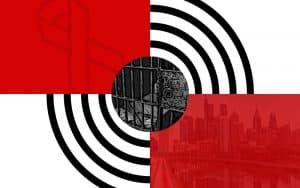Individuals who have experienced incarceration are disproportionately at risk for HIV acquisition in the United States. Additionally, their partners may be at an increased risk. The TITAN model allows us to research the impact of incarceration on HIV acquisition and on HIV transmission within community networks. We use our results to optimize interventions specific to these phenomena, such as HIV care engagement both during and post-incarceration and the delivery of pre-exposure prophylaxis to those at greatest risk.
This study emphasizes the potential role that prison- and community-based interventions for individuals experiencing incarceration can have in decreasing HIV transmissions among women in the community.
– Joella Adams:
The ripple effects of incarceration on HIV
The ripple effects of incarceration on HIV
![]()
Adams JW, Lurie MN, King M, Brady KA, Galea S, Friedman SR, Khan MR, Marshall BDL. Decreasing HIV transmissions to African American women through interventions for men living with HIV post-incarceration: An agent-based modeling study. PLOS One. July 15 2019. 14(7): e0219361.
